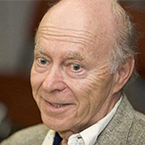
Irvin A. Rose, PhD, a Nobel laureate and Fellow of the AACR Academy, died June 2, 2015, at the age of 88. Rose, distinguished professor emeritus in the Department of Physiology and Biophysics at the University of California, Irvine, was known for his groundbreaking work that helped lead to further understanding of diseases including cancer, cystic fibrosis, and Parkinson’s disease.
Rose shared the 2004 Nobel Prize in chemistry for co-discovering the biological process of ubiquitin-mediated protein degradation. This process represents a cellular mechanism by which damaged or overabundant proteins are broken down and recycled. This phenomenon is of particular importance to the study of diseases that exhibit an accumulation of damaged or mutated proteins.
Rose’s research into this process proved that ubiquitin-mediated degradation of specific proteins, namely cyclins, was required for a cell to proceed through the cell cycle. This discovery fueled subsequent cancer-related studies investigating the ability of cancer cells to elude this regulatory process and, in turn, actively proliferate without cell-cycle arrest. More recently, this knowledge has been used to design targeted therapies intended to either facilitate the degradation of mutated proteins or to protect vital tumor-suppressive and/or housekeeping proteins from being degraded. This research specifically led to development of the drug bortezomib (Velcade), which was approved in 2003 by the U.S. Food and Drug Administration for the treatment of multiple myeloma.
Born July 16, 1926, in Brooklyn, New York, Rose was raised in Spokane, Washington, from the age of 13. He attended Washington State University in Pullman before serving in the Navy during World War II, and then completed his bachelor’s degree and received a doctorate in biochemistry from the University of Chicago, in 1948 and 1952, respectively. Rose taught at Yale School of Medicine in New Haven, Connecticut, from 1955 until 1963, when he joined Fox Chase Cancer Center in Philadelphia, where he began in the late 1970s his collaboration with Avram Hershko and Aaron Ciechanover from the Technion Institute of Technology in Haifa, Israel, with whom he was awarded the Nobel Prize. Among the additional accolades he received throughout his career, Rose was an honorary fellow of the Royal Society of Chemistry, an honorary member of the International Raoul Wallenberg Foundation, an elected member of the National Academy of Sciences, and was awarded the Regents’ Distinguished Alumnus Award from Washington State University and the Guggenheim fellowship award.
Rose remained at Fox Chase until his retirement in 1995. He moved to Laguna Woods, California, following his retirement, but soon afterward found space to continue his research in a laboratory at UC Irvine, where he was appointed to a research position.
Career Highlights
2005 Regents’ Distinguished Alumnus Award, Washington State University
2004 Nobel Prize in Chemistry
2004 Honorary Fellow, Royal Society of Chemistry
2004 Honorary Member, The International Raoul Wallenberg Foundation
1997 Emeritus Researcher, University of California at Irvine
1979 Elected Member, National Academy of Sciences, Washington, D.C.
1973-1977 Editorial Advisory Board, American Chemical Society
1971 Guggenheim Fellowship Award
1963 Scholar and Senior Member, Fox Chase Cancer Center
1954-1963 Faculty member, Department of Biochemistry, Yale Medical School
1952 PhD, University of Chicago